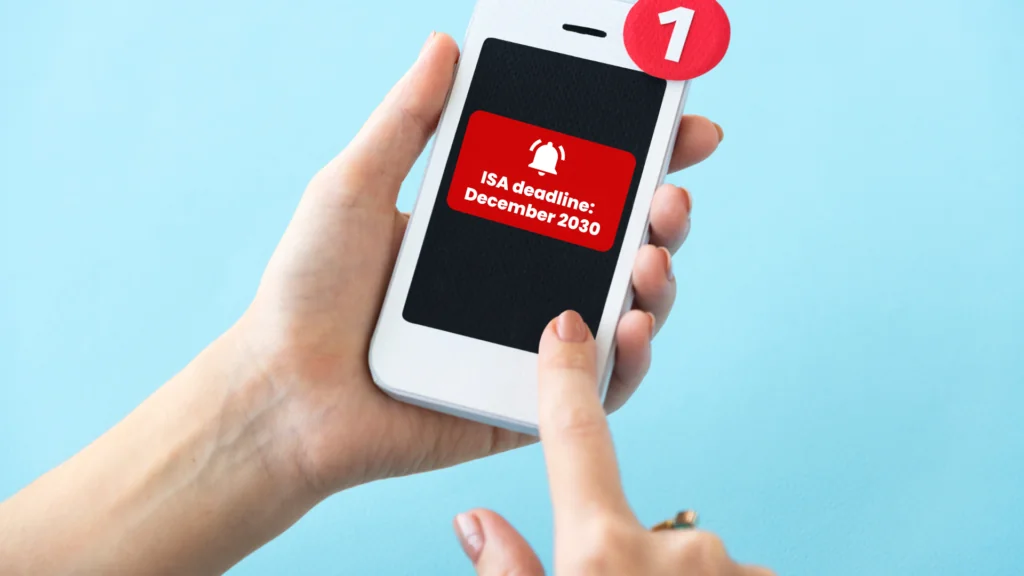- What is the First Homes Scheme?
- How Does It Work?
- Who Qualifies for a First Homes Scheme?
- Is the First Homes Scheme Right for You?
- How Do I Apply for a First Home Scheme?
- What Documents Do I Need?
- Can I Rent Out My First Home Scheme Property?
- Can I Sell a First Homes Scheme House Whenever I Want?
- Mortgage Under the First Homes Scheme
- Alternative Options to First Home Scheme
- The Bottom Line
The First Homes Scheme Explained
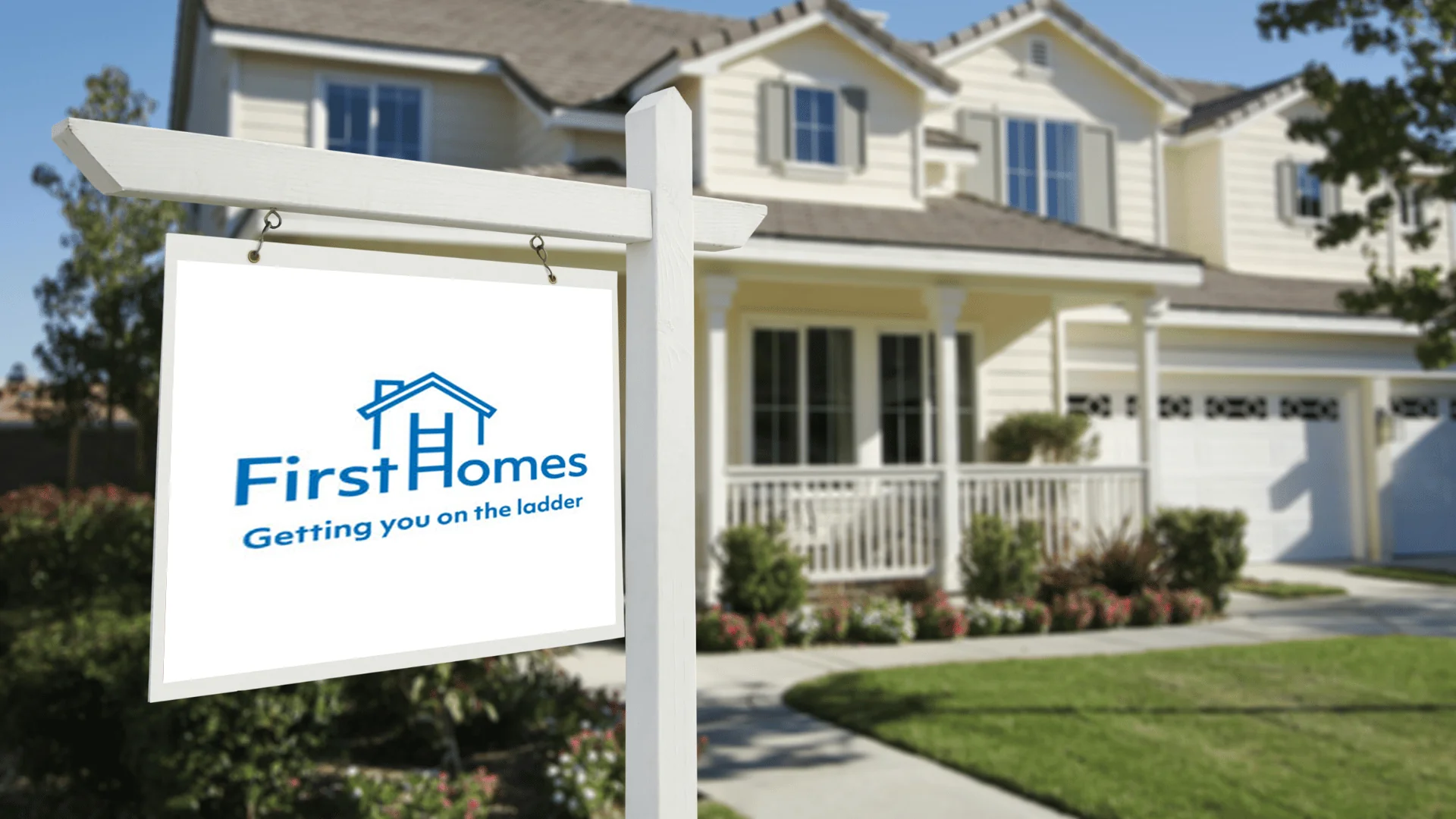
Buying your first home in England can be tough, especially with prices going up all the time. If you’re trying to buy your first home, this can make it feel impossible.
The good news is that the government has introduced a solution to make this dream more achievable for you: the First Homes Scheme.
What is the First Homes Scheme?
Launched in June 2021, the First Homes Scheme helps people like you, first-time buyers and key workers (like nurses, teachers, and police officers), purchase homes in England at a discounted price.
Through the scheme, you can get new-build homes, and sometimes even resale properties, for 30-50% less than the usual price.
To make things even easier, several lenders offer special 95% mortgages for these properties, as long as they meet specific price limits: £250,000 outside of London and £420,000 in Greater London.
Another benefit of the First Homes Scheme is that the discount is meant to be passed on to future buyers who are also first-time homeowners. This helps communities and key workers continue to benefit from affordable housing options.
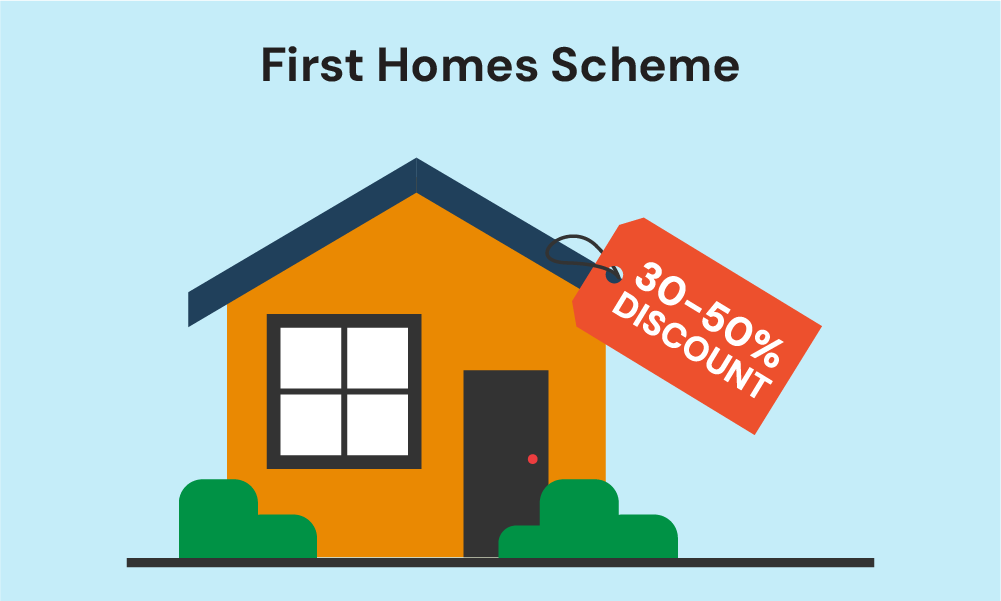
How Does It Work?
As discussed, the main advantage of the First Homes Scheme is that it offers a big discount on the cost of new-build homes.
Let’s understand this better: suppose you find a house worth £250,000. With this scheme, you might get a discount between 30% and 50%.
For instance, if you receive a 30% discount, the price of the £250,000 home drops to £175,000. To buy this home, you need to make a deposit, which is a small part of the price. For a house costing £175,000, the deposit is 5% of this price, which works out to be £8,750.
The remaining amount, £166,250, would be covered by a mortgage, which is a type of loan.
Keep in mind, that getting a mortgage also involves extra costs like legal fees and fees for a surveyor.
This scheme is unique because it lets you own the home completely. There’s no need to pay rent or share ownership.
It’s important to be aware of some limitations:
- You must use the property as your main or sole residence.
- When you sell the property, you must pass on the discount to the new buyer.
Who Qualifies for a First Homes Scheme?
To qualify for the First Homes Scheme, you must meet the following criteria:
- Be aged 18 or over
- Be a first-time buyer (never previously owned a property)
- Be able to secure a mortgage covering at least half the discounted purchase price
- Have an annual income under £80,000 (£90,000 in London) before taxes
If applying jointly, all individuals must meet the above criteria independently. Additionally, your combined income cannot exceed the limits mentioned above.
Some local councils may prioritise applications from:
- Key workers (like nurses, teachers, police officers) as defined by the council
- Residents already living in the area
- Individuals with lower incomes
If you’re in the army or were in the army in the last 5 years, or if you’re their family, you might not have to meet some income or residency rules.
But you still need to be 18 or older, buy your first home, and get a mortgage that covers at least half the house’s discounted price.
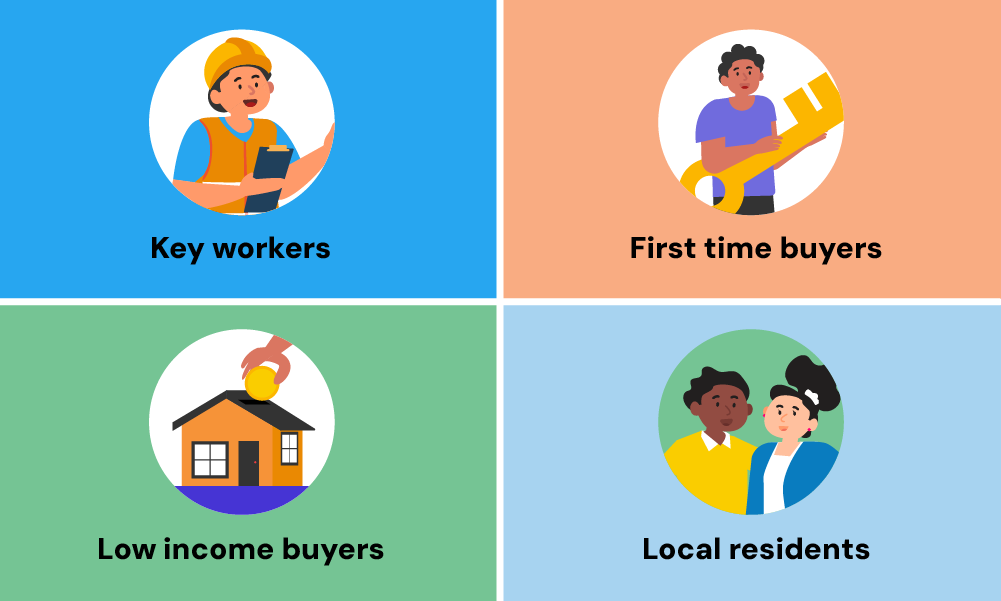
Is the First Homes Scheme Right for You?
Before considering the First Homes Scheme, carefully evaluate these key pros and cons to make an informed decision.
Pros
- Buy your first home at a large discount, between 30%-50%.
- A smaller deposit might be enough, possibly just 5%.
- Priority access for key workers and local residents, helping them stay local.
- No stamp duty on homes under £425,000, as tax is calculated on the discounted price.
Cons
- Only for first-time buyers with limited income.
- Price limits on properties, up to £250,000 outside London and £420,000 in London, after discount.
- There are a limited number of homes available, which may reduce your options.
- When selling, you must offer the same discount to the next qualified buyer, which could lower your selling price and market.
- You need a mortgage for at least 50% of the home’s price, which requires financial stability and savings.
How Do I Apply for a First Home Scheme?
Here are the steps to apply for a first home scheme:
Step 1 – Get an Agreement in Principle for a Mortgage
Before starting your house hunt, it’s important to find out how much you can borrow. This is done by getting an Agreement in Principle from a lender. This is a statement from a lender saying they’d be willing to lend you a certain amount. It’s not a guarantee, but it shows sellers you’re serious and have the funds.
Some lenders offer 95% mortgages for First Homes. This step is crucial as it gives you a clear budget for your search.
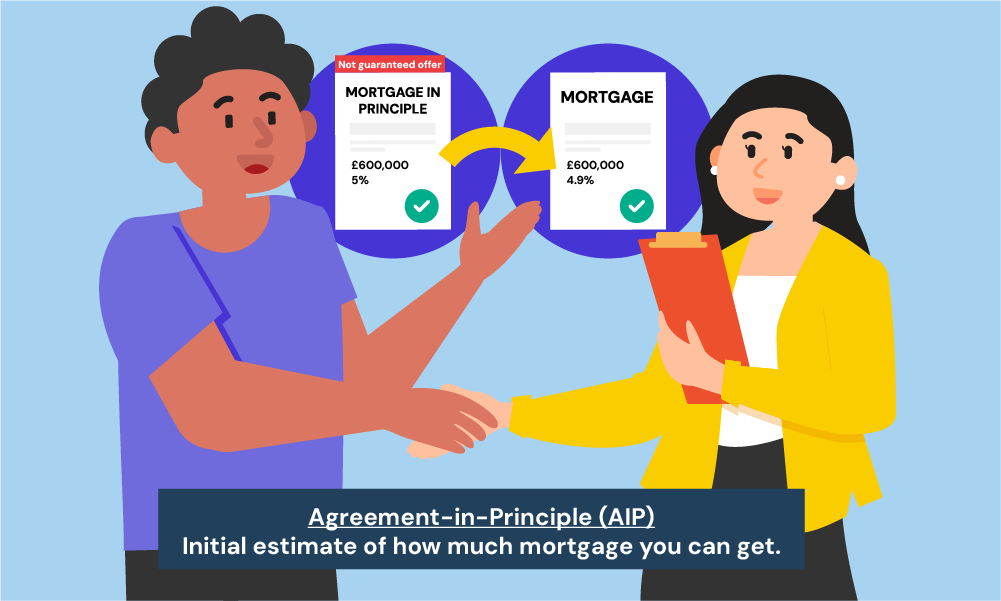
Step 2 – Start with the Property Hunt
Search for developers that offer new-build under the scheme. You can find these properties on developer websites, estate agent listings, and the official First Homes Scheme website.
Remember, you need to reserve the property and pay a reservation fee, which is usually refundable if you’re not eligible. You can’t move forward with the application without doing this.
Step 3 – Prove You’re a First-Time Buyer
Once you’ve found a property, reach out to the developer or estate agent and confirm its inclusion in the scheme.
They will assist you in verifying your eligibility, including checking if you’re a first-time buyer, your residency status, and your household income.
You’ll need to fill in an application form with the developer, who will then forward it to your local council.
Step 4 – Wait for Approval
Your application is reviewed by the local council.
If you meet all the criteria, they will issue a First Homes ‘Authority to Proceed’ and Eligibility Certificate. This usually takes about five working days. Give this certificate to your mortgage broker and conveyancer.
Step 5 – Apply for a Mortgage
With your ‘Authority to Proceed’, you can formally apply for your mortgage. This ensures you have the council’s approval before committing to a loan.
Step 6 – Work with a Conveyancer
Choose a conveyancer who is familiar with the First Homes Scheme to handle the legal details of your purchase.
They will follow the instructions given by the council and help you understand the legal obligations and terms of the scheme.
Step 7 – Exchange Contracts
Once your mortgage offer is confirmed and you’ve agreed on a contract, you’re ready to exchange contracts.
You must pay your deposit, typically 5%, at this point. It’s important to be cautious of potential fraud at this stage.
Moreover, before proceeding with the exchange of contracts, consult with your conveyancer. It’s crucial to inform them if there have been any changes in your circumstances that might affect your eligibility for the First Homes scheme.
You are then legally committed to buying the property. The completion date, when you move in, should be within six months from this exchange.
Step 8 – Completion and Moving In
On the completion date, your conveyancer will transfer the mortgage funds to the developer, you’ll receive the keys, and you can move in.
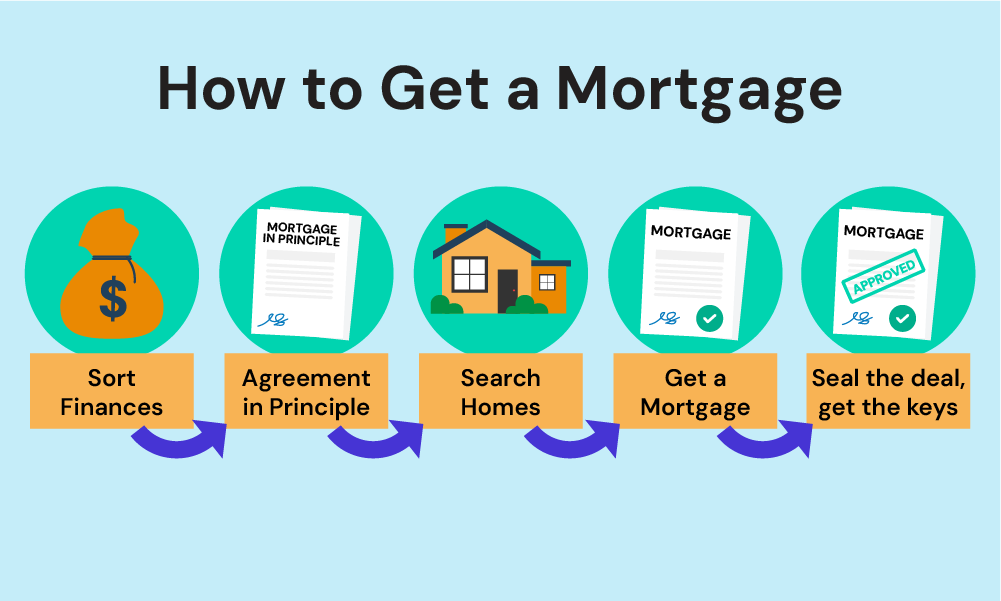
What Documents Do I Need?
To apply for the First Homes Scheme, you’ll need to gather specific documents to verify your eligibility and financial situation. Here’s what you’ll likely need:
- Proof of Age and Identity – This could be your passport, driving licence, or birth certificate.
- Proof of Residence – Utility bills, council tax statements, or bank statements can demonstrate your residency within the UK.
- Income Documentation – Provide payslips, tax returns, or employer letters confirming your income for the past year.
- First-Time Buyer Status – If you’ve never owned a property before, provide evidence like a mortgage statement or a letter from a solicitor confirming this.
- Mortgage Pre-Approval – Secure a mortgage pre-approval demonstrating your ability to cover at least half the discounted purchase price.
- Proof of Deposit – Show evidence of available funds for the deposit, typically 5% of the purchase price.
Note that the documents you need can vary depending on your situation and local council.
To be sure you have everything, check with your local government or the developer before you start. Having all the correct documents can help your application get processed faster.
Can I Rent Out My First Home Scheme Property?
Yes, but with conditions. You can rent out your entire property for a maximum of 2 years in total during your ownership, subject to specific conditions and approval from the local council.
Additionally, you should check with your mortgage lender as their approval may be required
Longer rentals are possible in specific situations like job changes, relationship breakdowns, domestic abuse escape, redundancy, or caring for someone. However, you’ll still need council and potentially lender approval.
On the other hand, you can rent out your room as long as it’s your main home and you live there too. And if you sell your First Homes property, the two-year rental limit starts over for the new owner.
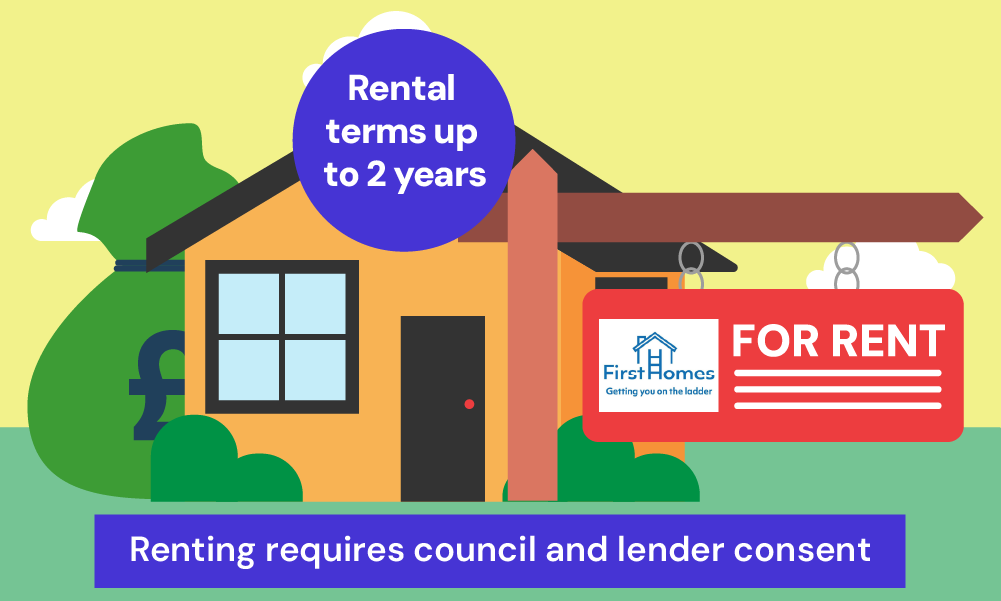
Can I Sell a First Homes Scheme House Whenever I Want?
No, you cannot sell a First Homes Scheme house whenever you want. While you have ownership of the property, there are restrictions on reselling it.
Here’s why:
- Eligibility of the buyer. You can only sell your First Homes Scheme house to another eligible first-time buyer. This means they must not have previously owned a home themselves or as part of a joint purchase.
- Discount applies upon resale. The discount you receive when buying the house must be applied to the sale price for the next buyer. This means they will benefit from the same discounted price you enjoyed.
- Market value assessment. The sale price is determined by an independent surveyor registered with RICS who values the property at its current market value. The discount is then calculated based on this valuation.
- Initial marketing period. You must initially market the property to potential buyers who meet any local eligibility criteria set by your local council.
- Wider marketing after 3 months. If you haven’t found a buyer after 3 months, you can then market the property to anyone who meets the national First Homes eligibility criteria.
- Selling on the open market. Under special circumstances, such as the inability to find a buyer after 6 months or facing severe financial difficulties, you might be allowed to sell on the open market at full market value. This requires approval from your local council.
If the council approves selling on the open market, you might need to repay the original discount or continue trying to sell under the scheme for another 6 months.
In summary, while you can ultimately sell your First Homes Scheme house, there are restrictions on who you can sell it to and the price you can ask for.
These restrictions guarantee that the property remains accessible to future first-time buyers at a discounted price.
Remember: It’s important to consult with your local council or a qualified advisor for specific details and guidance regarding selling your First Homes Scheme house.

Mortgage Under the First Homes Scheme
Several lenders are currently offering 95% loan-to-value (LTV) mortgages for the First Homes Scheme, including:
- Chorley Building Society
- Darlington Building Society
- Halifax
- Leeds Building Society
- Mansfield Building Society
- Nationwide Building Society
- Newcastle Building Society
Alternative Options to First Home Scheme
If you’re not qualified or are still undecided about the first home scheme, you may check some of these alternatives in buying your home:
Shared Ownership
This option allows you to purchase a share of a property (between 25% and 75%) and pay rent on the remaining share to a housing association.
This can be a good way to get onto the property ladder with a smaller deposit, but remember you’ll be responsible for maintenance and service charges.
This scheme allows eligible council tenants in England to purchase their homes at a discounted price. However, eligibility criteria are strict, and the scheme is not available in Scotland, Wales, or Northern Ireland.
Rent to Buy
This scheme allows you to rent a property with an option to purchase it later at a predetermined price. However, it’s not widely available, and specific terms vary depending on the provider.
This scheme helps first-time buyers with a 5% – 9% deposit get a mortgage with participating lenders. Applications are currently open until 30 June 2025.
These government-backed savings accounts offer a 25% bonus on your contributions, specifically for first-time home purchases or retirement.
This scheme is closed for new applications now, but those already in the process can proceed. With this, you can borrow an equity loan of up to 20% of the purchase price for new-build homes, reducing the upfront deposit required.
With this option, a family member or friend with a strong financial record can guarantee your mortgage, making it easier to qualify for a better rate or larger loan amount. But it carries risks for the guarantor if you default on the loan.
Gifted Deposits or Bank of Mum and Dad
Borrowing from family or friends can be a way to raise a deposit. However, ensure clear agreements and repayment plans are in place to avoid financial strain on both parties.
The Bottom Line
Given the unique rules and potential hurdles of the First Homes Scheme, finding a mortgage advisor with experience in this area can make the process much easier.
They’ll help you check if you qualify, plan your finances, and overcome any challenges, making your journey to your dream home smoother.
Want a simple way to find the right broker who understands the scheme and can guide you confidently? Reach out to us. We’ll set you up for a free, no-pressure chat with a top mortgage advisor who can help you sort out your mortgage and get the best deal.
Get Matched With Your Dream Mortgage Advisor...

Frequently asked questions
How many people have currently used this scheme?
First Homes properties first went on the market in June 2021 and the first few were sold and occupied in November 2021.
Can I remortgage a First Home property?
Yes, you can remortgage your first home scheme property. But, the loan amount will be based on the current market value of the property, not the discounted purchase price you paid under the scheme.
What happens to my First Home if my circumstances change?
Even if your income increases or your key worker status changes, you won’t be forced to sell your First Home. Ownership remains yours, regardless of any shifts in your situation.
Can I leave my First Home to someone in my will?
While passing your First Home down as inheritance is absolutely an option, the recipient must meet the eligibility criteria of the scheme. If they don’t qualify, they’ll need to sell the property.
Does the First Homes scheme extend to all regions within the UK?
The First Homes scheme is only available in England. It doesn’t extend to other parts of the U.K. like Scotland, Wales, or Northern Ireland.



